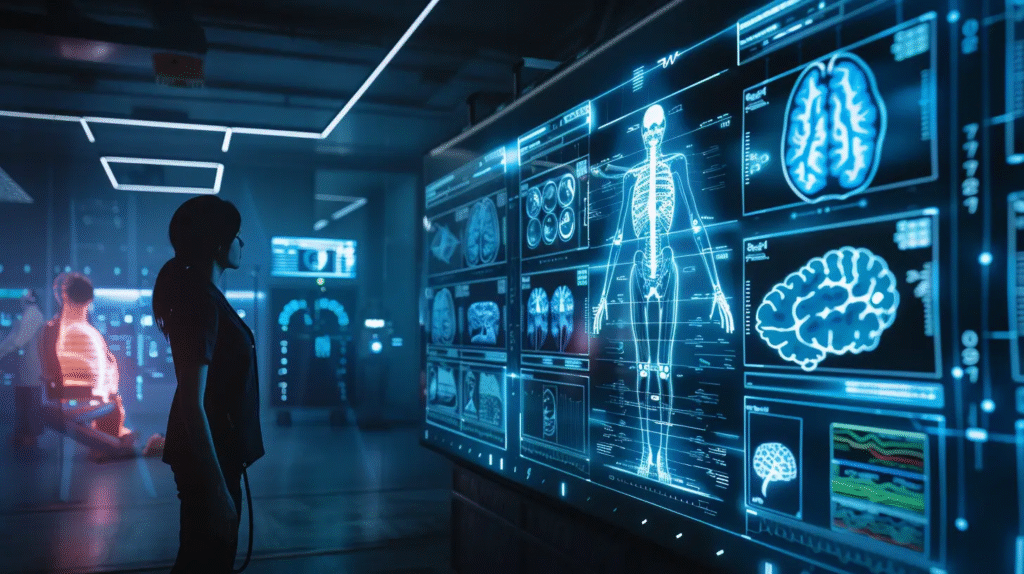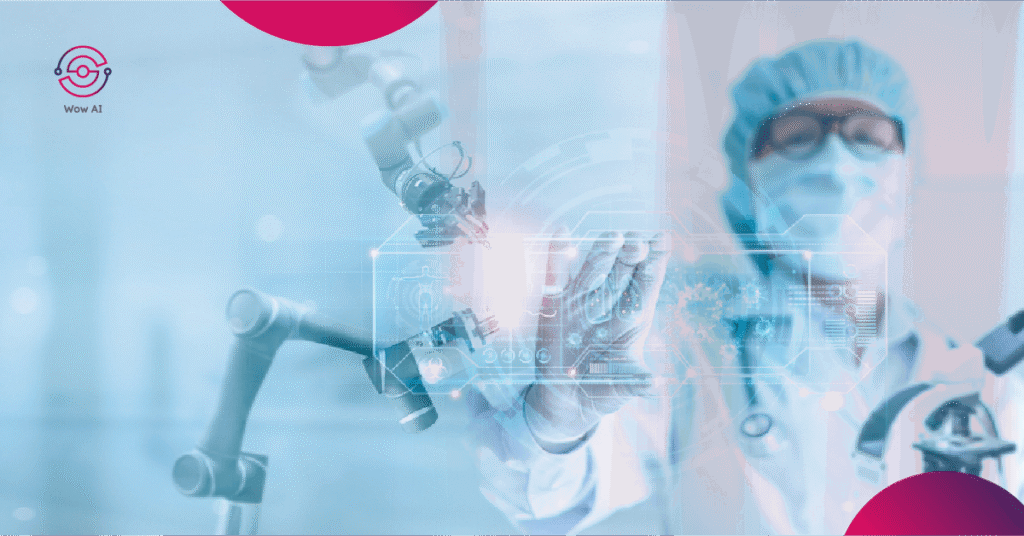We’re Not in the Future — It’s Happening Now
Healthcare is changing, and one of the biggest reasons is AI.
Doctors today aren’t just relying on years of training or stacks of reports. They’re also turning to artificial intelligence to help them diagnose illnesses faster, spot early warning signs, and even predict future health issues.
That doesn’t mean robots are replacing doctors. Far from it.
Think of AI as a super-smart assistant that reads faster, analyzes better, and never forgets. And when it teams up with skilled doctors? Magic happens.
What Does AI Actually Do in Healthcare?
So, what is AI in healthcare really all about?
At its core, it means using smart computer systems to handle tasks like:
- Scanning medical images (X-rays, MRIs, etc.)
- Reading through patient records
- Spotting trends and risk factors
- Suggesting treatment options
It’s about speeding things up, catching more, and reducing human error — all while helping doctors do their jobs even better.
How AI Helps Diagnose Faster (and Smarter)

Let’s look at where AI really shines in medical diagnosis.
1. AI Sees What Humans Might Miss
Doctors are amazing at what they do, but even the best eyes can overlook tiny details in an X-ray or MRI. AI doesn’t get tired or distracted.
It can scan images in seconds and point out anything unusual — like signs of cancer, fractures, or internal bleeding.
Example: Google’s DeepMind built an AI that can detect eye diseases by analyzing retina scans. It performs as well as top specialists.
2. It Reads Patient Data in a Snap
Have you ever seen a doctor flip through a thick file of medical notes? It takes time. AI reads all of that in seconds.
It can:
- Compare lab results
- Spot patterns in your medical history
- Flag anything that looks risky
This gives doctors a head start — they can focus on you, not the paperwork.
3. AI Can Predict Problems Before They Happen
One of the most powerful things AI does is look ahead. It can take your data — age, weight, past illnesses, lifestyle — and flag early signs of diseases like:
- Diabetes
- Heart problems
- Certain cancers
Example: IBM Watson has used AI to predict cancer risks by scanning through thousands of medical records and research studies.
Some Real-Life AI Tools in Action
Here are a few companies using AI to make healthcare better today:
- PathAI: Helps spot cancer cells in biopsy samples with high accuracy.
- Aidoc: Alerts ER doctors if someone has a brain bleed or clot based on their CT scan.
- Tempus: Uses AI and genetic data to suggest better cancer treatments.
Why AI in Healthcare Matters
Let’s break down the real benefits.
| Benefit | Why It Matters |
| Speed | Diagnoses happen in minutes, not days |
| Accuracy | AI helps catch errors and misses |
| Early Detection | Health issues are found before symptoms even show |
| Personalization | Treatment plans are tailored to the individual |
| Doctor Support | Doctors spend more time with patients, less on admin |
Every step is faster and smarter with AI involved.
What’s the Catch? Are There Any Risks?
Of course, no system is perfect — and AI is no exception.
Here are a few concerns people are keeping an eye on:
Bottom line? AI should help doctors, not replace them.
What’s Next for AI in Medicine?
AI isn’t just about scans and diagnoses anymore.
In the coming years, we’ll see:
- AI-assisted surgeries with robotic tools
- 24/7 virtual health assistants on your phone
- Faster drug discovery with AI speeding up research
- Mental health support through smart chatbots and monitoring tools
It’s not science fiction. It’s happening already.
Final Take: AI + Doctors = A Healthier Future
AI in healthcare is one of the most exciting changes we’ve seen in decades.
It’s helping doctors:
- Detect illnesses early
- Create personalized treatments
- Cut down diagnosis times
- Reduce the pressure in overloaded hospitals
It’s not about replacing anyone. It’s about working together for better care.
startups in the space.
Quick Summary: Why AI in Healthcare Matters
| What AI Does | How It Helps You |
| Reads medical scans | Speeds up diagnosis |
| Predicts health risks | Helps stop diseases early |
| Recommends treatments | Gets you the right care faster |
| Supports doctors | Keeps human judgment front and center |
| Protects your time | Less waiting, more action |
FAQ: AI in Healthcare – Diagnosing Faster, Saving Lives

1. What does AI in healthcare actually mean?
AI in healthcare means using smart technology (like software and algorithms) to help doctors and hospitals do things faster and better. This includes diagnosing illnesses, reading medical scans, suggesting treatments, and even predicting health problems before they happen.
2. Is AI replacing doctors?
Not at all. AI is more like a powerful assistant. It helps doctors by quickly analyzing data, spotting patterns, and providing insights. But in the end, doctors make the final decisions.
3. How is AI used to diagnose diseases?
AI can:
- Read X-rays, MRIs, and CT scans in seconds
- Compare your health history with thousands of others
- Detect signs of illness earlier than usual
- Suggest possible conditions for doctors to review
This speeds up the process and often improves accuracy.
4. Can AI really be faster than a doctor?
Yes, in certain tasks. For example, an AI program can scan hundreds of images in a few seconds. A human doctor might take 20–30 minutes or longer to do the same. But again, doctors always confirm the final diagnosis.
5. Is it safe to trust AI with my health data?
AI systems in healthcare follow strict rules to protect your privacy. However, data safety depends on the hospital or company using the AI. Always ask how your data is stored and used.
6. What are some examples of AI being used in real hospitals?
Here are a few:
- PathAI helps detect cancer cells in biopsies
- Aidoc alerts ER doctors about bleeding in the brain
- Tempus uses genetic data to help doctors choose the right cancer treatment
These tools are already saving lives around the world.
7. How does AI help in emergencies?
In emergency rooms, AI can quickly scan brain scans or chest X-rays and flag life-threatening issues like strokes, clots, or internal bleeding. This helps doctors act faster — sometimes within minutes.
8. Can AI predict health problems before I feel sick?
Yes! AI can analyze your health data, family history, lifestyle, and habits to flag risks like:
The earlier a problem is caught, the easier it is to treat.
- Heart disease
- Diabetes
- Certain types of cancer
9. What are the main benefits of using AI in healthcare?

| Benefit | Why It Matters |
| Speed | Faster diagnosis and treatment |
| Accuracy | Fewer errors, better outcomes |
| Early detection | Catches diseases before symptoms |
| Personalization | Tailored treatment plans |
| Support | Helps reduce doctor burnout and admin work |
10. What are the risks or downsides?
Some things to be aware of:
- Data privacy concerns
- Bias in AI (if trained on limited data)
- Overreliance — AI should support, not replace, doctors
- Regulation — laws are still catching up with the tech
